Learning
Dr. Matthieu R Bloch
Wednesday, December 1, 2021
Logistics
General announcements
Assignment 6 posted (last assignment)
Due December 7, 2021 for bonus, deadline December 10, 2021
2 lectures left
Let me know what’s missing
Assignment 5 grades posted
Reviewing Midterm2 grades one last time
What’s on the agenda for today?
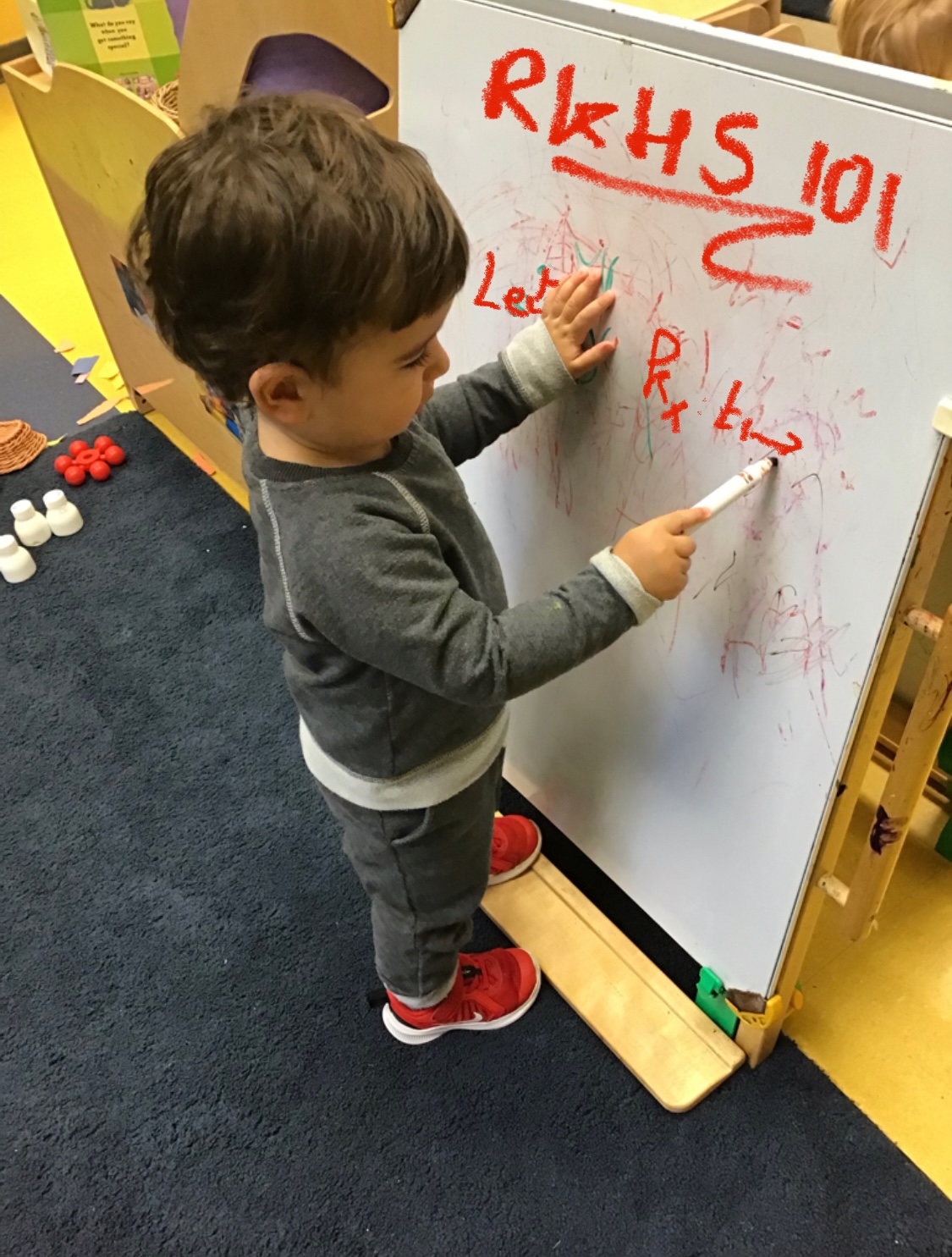
The learning problem and why we need probabilities.
Lecture notes 17 and 23
Components of supervised machine learning
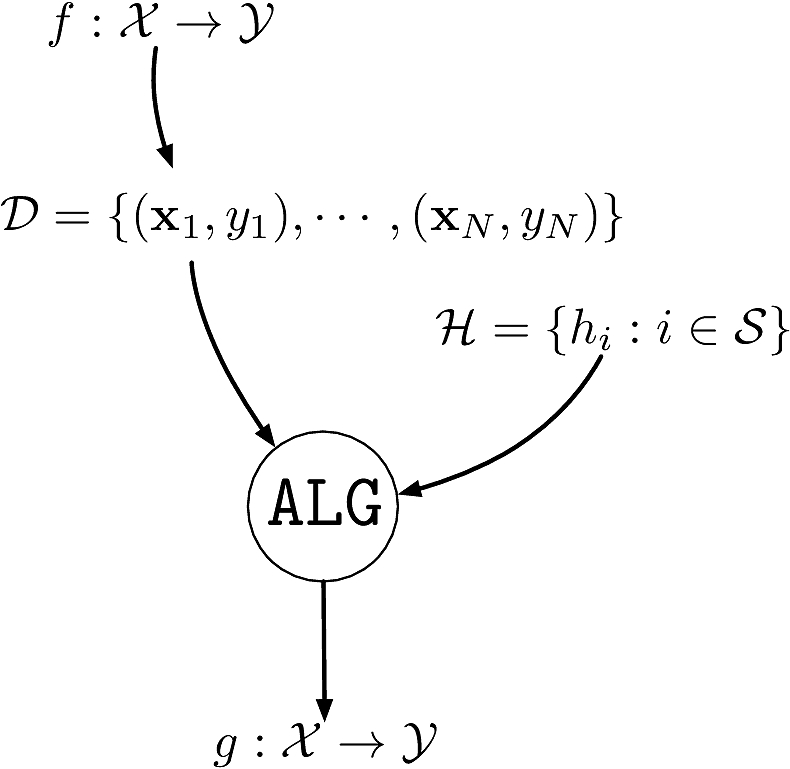
- An unknown function \(f:\calX\to\calY:\bfx\mapsto y=f(\bfx)\) to learn
- The formula to distinguish cats from dogs
- A dataset \(\calD\eqdef\{(\bfx_1,y_1),\cdots,(\bfx_N,y_N)\}\)
- \(\bfx_i\in\calX\eqdef\bbR^d\): picture of cat/dog
- \(y_i\in\calY\eqdef\bbR\): the corresponding label cat/dog
- A set of hypotheses \(\calH\) as to what the function could be
- Example: deep neural nets with AlexNet architecture
- An algorithm \(\texttt{ALG}\) to find the best \(h\in\calH\) that explains \(f\)
- Terminology:
- \(\calY=\bbR\): regression problem
- \(\card{\calY}<\infty\): classification problem
- \(\card{\calY}=2\): binary classification problem
- The goal is to generalize, i.e., be able to classify inputs we have not seen.
A learning puzzle
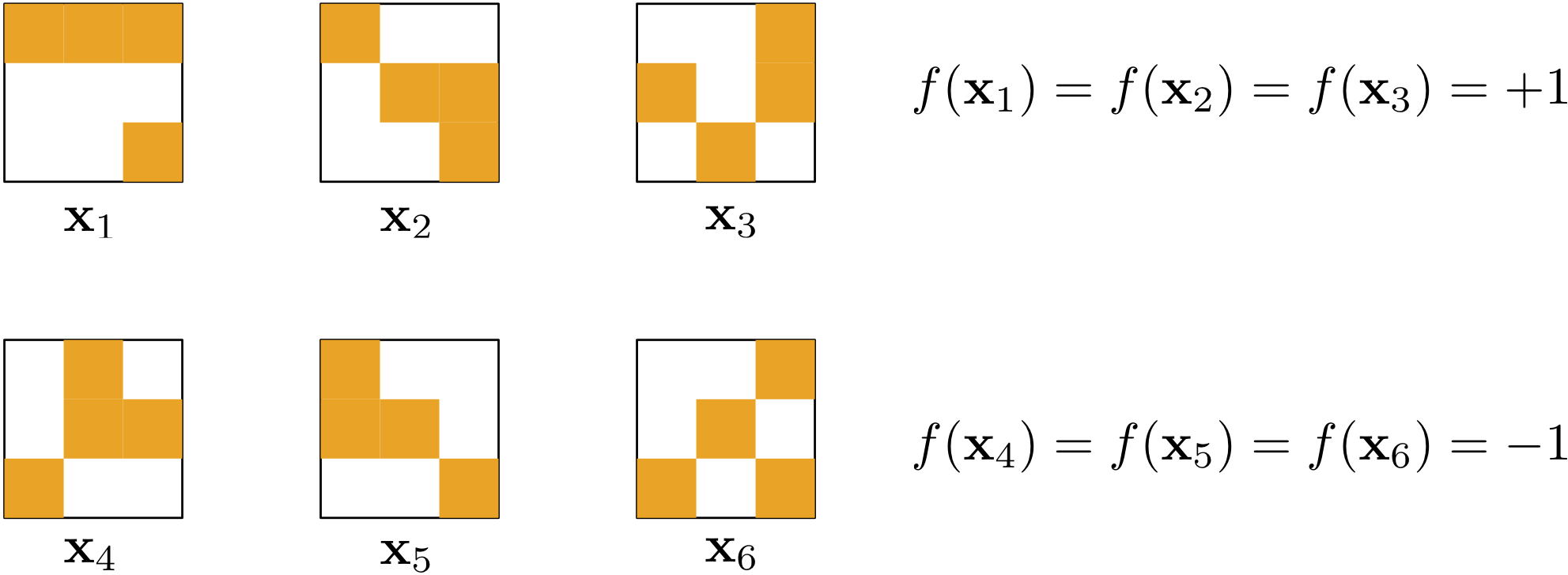
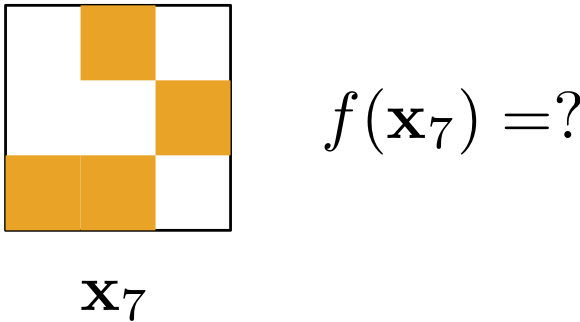
- Learning seems impossible without additional assumptions!
Possible vs probable
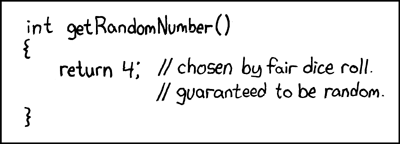
Flip a biased coin, lands on head with unknown probability \(p\in[0,1]\)
\(\P{\text{head}}=p\) and \(\P{\text{tail}}=1-p\)
Say we flip the coin \(N\) times, can we estimate \(p\)?
\[ \hat{p} = \frac{\text{\# head}}{N} \]
Can we relate \(\hat{p}\) to \(p\)?
- The law of large numbers tells us that \(\hat{p}\) converges in probability to \(p\) as \(N\) gets large \[ \forall\epsilon>0\quad\P{\abs{\hat{p}-p}>\epsilon}\mathop{\longrightarrow}_{N\to\infty} 0. \]
It is possible that \(\hat{p}\) is completely off but it is not probable
Components of supervised machine learning
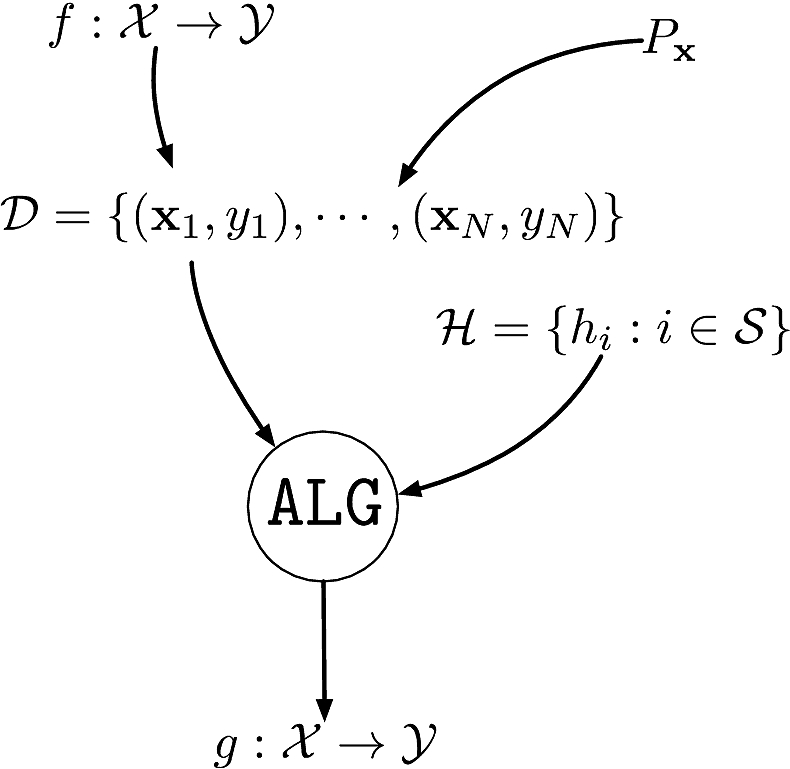
An unknown function \(f:\calX\to\calY:\bfx\mapsto y=f(\bfx)\) to learn
A dataset \(\calD\eqdef\{(\bfx_1,y_1),\cdots,(\bfx_N,y_N)\}\)
- \(\{\bfx_i\}_{i=1}^N\) i.i.d. from unknown distribution \(P_{\bfx}\) on \(\calX\)
- \(\{y_i\}_{i=1}^N\) are the corresponding labels \(y_i\in\calY\eqdef\bbR\)
A set of hypotheses \(\calH\) as to what the function could be
An algorithm \(\texttt{ALG}\) to find the best \(h\in\calH\) that explains \(f\)
Another learning puzzle
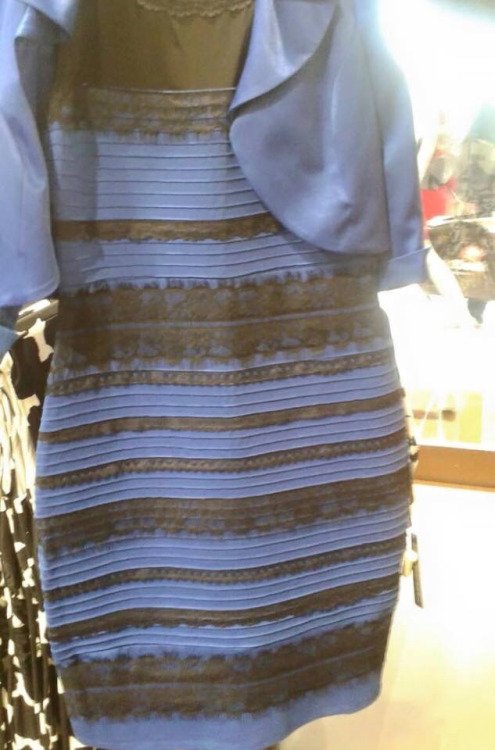
Components of supervised machine learning
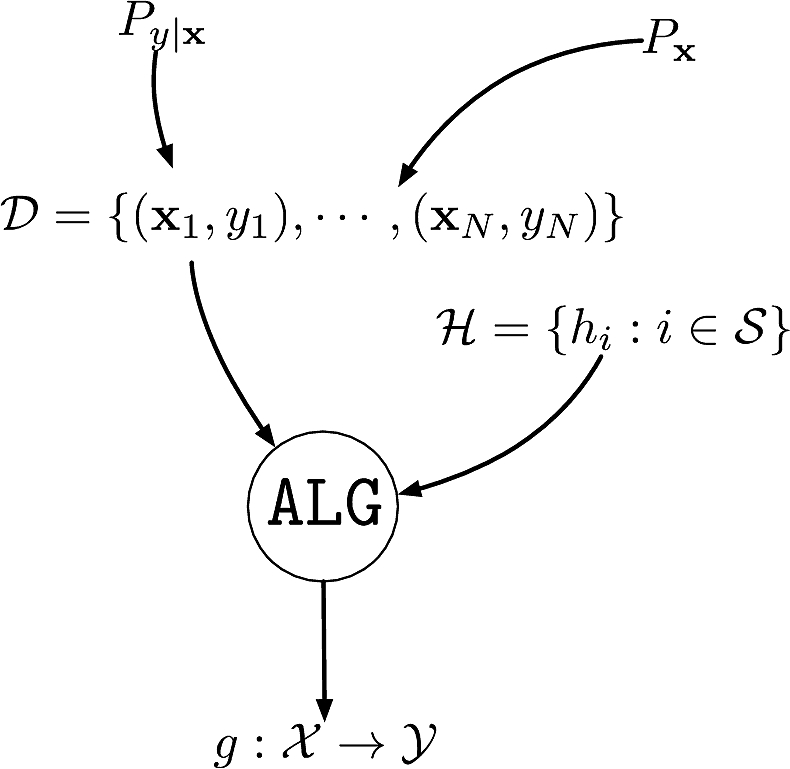
An unknown conditional distribution \(P_{y|\bfx}\) to learn
- \(P_{y|\bfx}\) models \(f:\calX\to\calY\) with noise
A dataset \(\calD\eqdef\{(\bfx_1,y_1),\cdots,(\bfx_N,y_N)\}\)
- \(\{\bfx_i\}_{i=1}^N\) i.i.d. from distribution \(P_{\bfx}\) on \(\calX\)
- \(\{y_i\}_{i=1}^N\) are the corresponding labels \(y_i\sim P_{y|\bfx=\bfx_i}\)
A set of hypotheses \(\calH\) as to what the function could be
An algorithm \(\texttt{ALG}\) to find the best \(h\in\calH\) that explains \(f\)
- The roles of \(P_{y|\bfx}\) and \(P_{\bfx}\) are different
- \(P_{y|\bfx}\) is what we want to learn, captures the underlying function and the noise added to it
- \(P_{\bfx}\) models sampling of dataset, need not be learned
Yet another learning puzzle

- Assume that you are designing a fingerprint authentication system
- You trained your system with a fancy machine learning system
- The probability of wrongly authenticating is 1%
- The probability of correctly authenticating is 60%
- Is this a good system?
- It depends!
- If you are GTRI, this might be ok (security matters more)
- If you are Apple, this is not acceptable (convenience matters more)
- There is an application dependent cost that can affect the design
Components of supervised machine learning
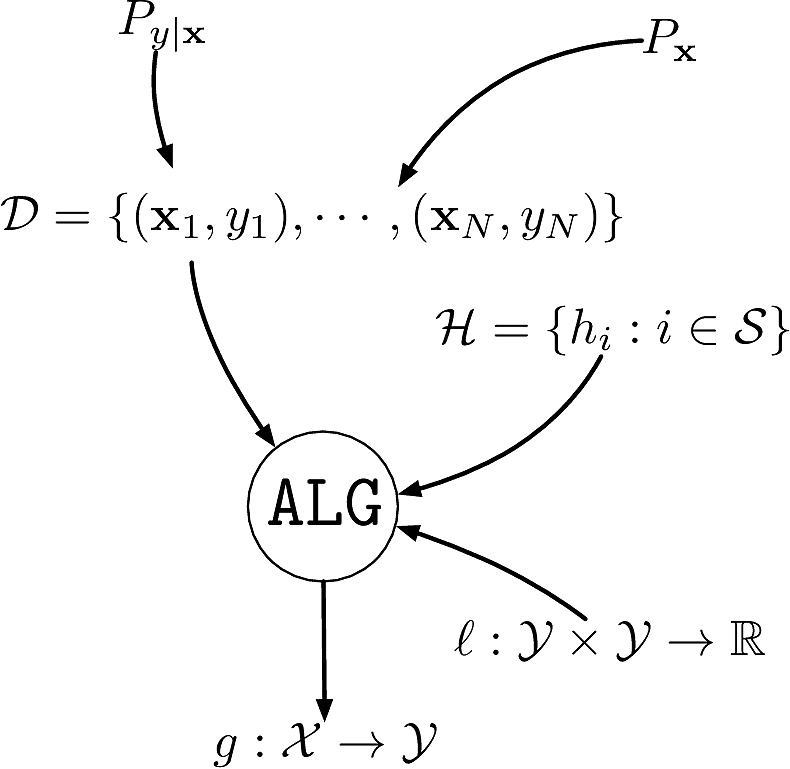
A dataset \(\calD\eqdef\{(\bfx_1,y_1),\cdots,(\bfx_N,y_N)\}\)
- \(\{\bfx_i\}_{i=1}^N\) i.i.d. from an unknown distribution \(P_{\bfx}\) on \(\calX\)
An unknown conditional distribution \(P_{y|\bfx}\)
- \(P_{y|\bfx}\) models \(f:\calX\to\calY\) with noise
- \(\{y_i\}_{i=1}^N\) are the corresponding labels \(y_i\sim P_{y|\bfx=\bfx_i}\)
A set of hypotheses \(\calH\) as to what the function could be
A loss function \(\ell:\calY\times\calY\rightarrow\bbR^+\) capturing the “cost” of prediction
An algorithm \(\texttt{ALG}\) to find the best \(h\in\calH\) that explains \(f\)
The supervised learning problem
Learning is not memorizing
- Our goal is not to find \(h\in\calH\) that accurately assigns values to elements of \(\calD\)
- Our goal is to find the best \(h\in\calH\) that accurately predicts values of unseen samples
Consider hypothesis \(h\in\calH\). We can easily compute the empirical risk (a.k.a. in-sample error) \[\widehat{R}_N(h)\eqdef\frac{1}{N}\sum_{i=1}^N\ell(y_i,h(\bfx_i))\]
What we really care about is the true risk (a.k.a. out-sample error) \(R(h)\eqdef\E[\bfx y]{\ell(y,h(\bfx))}\)
Question #1: Can we generalize?
- For a given \(h\), is \(\widehat{R}_N(h)\) close to \({R}(h)\)?
Question #2: Can we learn well?
- The best hypothesis is \(h^{\sharp}\eqdef\argmin_{h\in\calH}R(h)\) but we can only find \(h^{*}\eqdef\argmin_{h\in\calH}\widehat{R}_N(h)\)
- Is \(\widehat{R}_N(h^*)\) close to \(R(h^{\sharp})\)?
- Is \(R(h^{\sharp})\approx 0\)?
A simpler supervised learning problem
Consider a special case of the general supervised learning problem
Dataset \(\calD\eqdef\{(\bfx_1,y_1),\cdots,(\bfx_N,y_N)\}\)
- \(\{\bfx_i\}_{i=1}^N\) drawn i.i.d. from unknown \(P_{\bfx}\) on \(\calX\)
- \(\{y_i\}_{i=1}^N\) labels with \(\calY=\{0,1\}\) (binary classification)
Unknown \(f:\calX\to\calY\), no noise.
Finite set of hypotheses \(\calH\), \(\card{\calH}=M<\infty\)
- \(\calH\eqdef\{h_i\}_{i=1}^M\)
Binary loss function \(\ell:\calY\times\calY\rightarrow\bbR^+:(y_1,y_2)\mapsto \indic{y_1\neq y_2}\)
In this very specific case, the true risk simplifies \[ R(h)\eqdef\E[\bfx y]{\indic{h(\bfx)\neq y}} = \P[\bfx y]{h(\bfx)\neq y} \]
The empirical risk becomes \[ \widehat{R}_N(h)=\frac{1}{N}\sum_{i=1}^{N} \indic{h(\bfx_i)\neq y_i} \]
Can we learn?
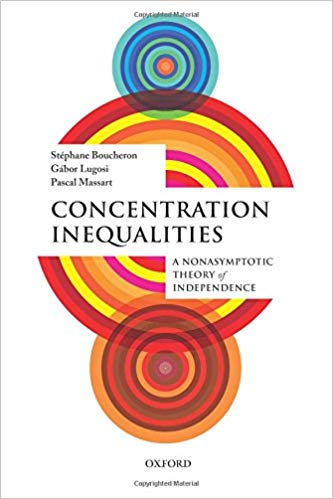
Our objective is to find a hypothesis \(h^*=\argmin_{h\in\calH}\widehat{R}_N(h)\) that ensures a small risk
For a fixed \(h_j\in\calH\), how does \(\widehat{R}_N(h_j)\) compares to \({R}(h_j)\)?
Observe that for \(h_j\in\calH\)
The empirical risk is a sum of iid random variables \[ \widehat{R}_N(h_j)=\frac{1}{N}\sum_{i=1}^{N} \indic{h_j(\bfx_i)\neq y_i} \]
\(\E{\widehat{R}_N(h_j)} = R(h_j)\)
\(\P{\abs{\widehat{R}_N(h_j)-{R}(h_j)}>\epsilon}\) is a statement about the deviation of a normalized sum of iid random variables from its mean
We’re in luck! Such bounds, a.k.a, known as concentration inequalities, are a well studied subject
Concentration inequalities: basics
Let \(X\) be a non-negative real-valued random variable. Then for all \(t>0\) \[\P{X\geq t}\leq \frac{\E{X}}{t}.\]
Let \(X\) be a real-valued random variable. Then for all \(t>0\) \[\P{\abs{X-\E{X}}\geq t}\leq \frac{\Var{X}}{t^2}.\]
Let \(\{X_i\}_{i=1}^N\) be i.i.d. real-valued random variables with finite mean \(\mu\) and finite variance \(\sigma^2\). Then \[\P{\abs{\frac{1}{N}\sum_{i=1}^N X_i-\mu}\geq\epsilon}\leq\frac{\sigma^2}{N\epsilon^2}\qquad\lim_{N\to\infty}\P{\abs{\frac{1}{N}\sum_{i=1}^N X_i-\mu}\geq \epsilon}=0.\]
Back to learning
By the law of large number, we know that \[ \forall\epsilon>0\quad\P[\{(\bfx_i,y_i)\}]{\abs{\widehat{R}_N(h_j)-{R}(h_j)}\geq\epsilon}\leq \frac{\Var{\indic{h_j(\bfx_1)\neq y_1}}}{N\epsilon^2}\leq \frac{1}{N\epsilon^2}\]
Given enough data, we can generalize
How much data? \(N=\frac{1}{\delta\epsilon^2}\) to ensure \(\P{\abs{\widehat{R}_N(h_j)-{R}(h_j)}\geq\epsilon}\leq \delta\).
That’s not quite enough! We care about \(\widehat{R}_N(h^*)\) where \(h^*=\argmin_{h\in\calH}\widehat{R}_N(h)\)
- If \(M=\card{\calH}\) is large we should expect the existence of \(h_k\in\calH\) such that \(\widehat{R}_N(h_k)\ll R(h_k)\)
\[ \P{\abs{\widehat{R}_N(h^*)-{R}(h^*)}\geq\epsilon} \leq \P{\exists j:\abs{\widehat{R}_N(h_j)-{R}(h_j)}\geq\epsilon} \]
\[ \P{\abs{\widehat{R}_N(h^*)-{R}(h^*)}\geq\epsilon} \leq \frac{M}{N\epsilon^2} \]
If we choose \(N\geq\lceil\frac{M}{\delta\epsilon^2}\rceil\) we can ensure \(\P{\abs{\widehat{R}_N(h^*)-{R}(h^*)}\geq\epsilon}\leq \delta\).
- That’s a lot of samples!
Concentration inequalities: not so basic
We can obtain much better bounds than with Chebyshev
Let \(\{X_i\}_{i=1}^N\) be i.i.d. real-valued zero-mean random variables such that \(X_i\in[a_i;b_i]\) with \(a_i<b_i\). Then for all \(\epsilon>0\) \[\P{\abs{\frac{1}{N}\sum_{i=1}^N X_i}\geq\epsilon}\leq 2\exp\left(-\frac{2N^2\epsilon^2}{\sum_{i=1}^N(b_i-a_i)^2}\right).\]
In our learning problem \[ \forall\epsilon>0\quad\P{\abs{\widehat{R}_N(h_j)-{R}(h_j)}\geq\epsilon}\leq 2\exp(-2N\epsilon^2)\]
\[ \forall\epsilon>0\quad\P{\abs{\widehat{R}_N(h^*)-{R}(h^*)}\geq\epsilon}\leq 2M\exp(-2N\epsilon^2)\]
We can now choose \(N\geq \lceil\frac{1}{2\epsilon^2}\left(\ln \frac{2M}{\delta}\right)\rceil\)
\(M\) can be quite large (almost exponential in \(N\)) and, with enough data, we can generalize \(h^*\).
How about learning \(h^{\sharp}\eqdef\argmin_{h\in\calH}R(h)\)?
Learning can work!
If \(\forall j\in\calH\,\abs{\widehat{R}_N(h_j)-{R}(h_j)}\leq\epsilon\) then \(\abs{R(h^*)-{R}(h^\sharp)}\leq 2\epsilon\).
How do we make \(R(h^\sharp)\) small?
- Need bigger hypothesis class \(\calH\)! (could we take \(M\to\infty\)?)
- Fundamental trade-off of learning
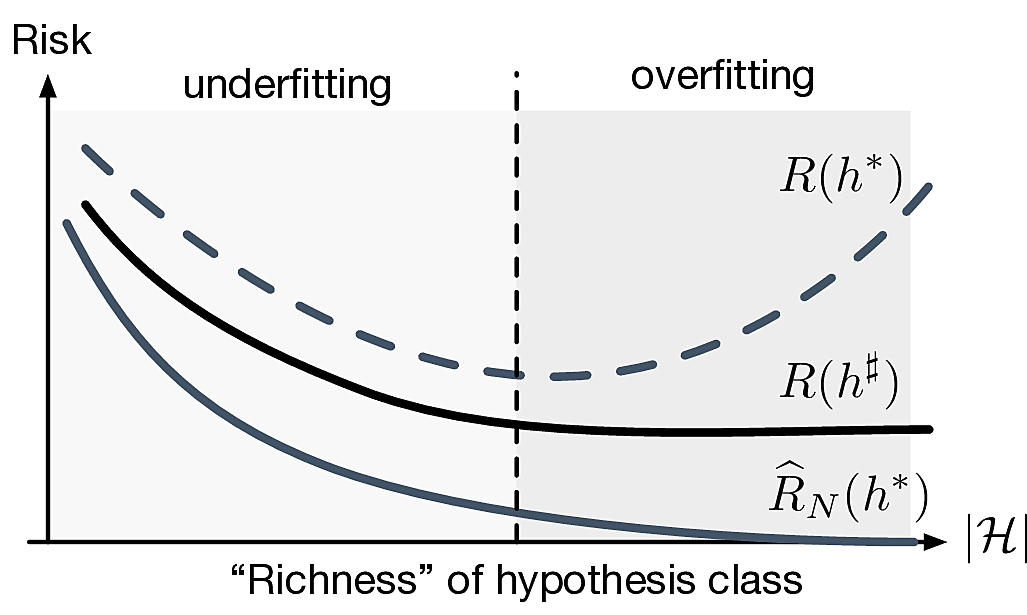
Probably Approximately Correct Learnability
- A hypothesis set \(\calH\) is (agnostic) PAC learnable if there exists a function \(N_\calH:]0;1[^2\to\bbN\) and a learning algorithm such that:
- for very \(\epsilon,\delta\in]0;1[\),
- for every \(P_\bfx\), \(P_{y|\bfx}\),
- when running the algorithm on at least \(N_\calH(\epsilon,\delta)\) i.i.d. examples, the algorithm returns a hypothesis \(h\in\calH\) such that \[\P[\bfx y]{\abs{{R}(h)-R(h^\sharp)}\leq\epsilon}\geq 1-\delta\]
The function \(N_{\calH}(\epsilon,\delta)\) is called sample complexity
We have effectively already proved the following result
A finite hypothesis set \(\calH\) is PAC learnable with the Empirical Risk Minimization algorithm and with sample complexity \[N_\calH(\epsilon,\delta)={\lceil{\frac{2\ln(2\card{\calH}/\delta)}{\epsilon^2}}\rceil}\]
What is a good hypothesis set?

Ideally we want \(\card{\calH}\) small so that \(R(h^*)\approx R(h^\sharp)\) and get lucky so that \(R(h^*)\approx 0\)
In general this is not possible
Remember, we usually have to learn \(P_{y|\bfx}\), not a function \(f\)
Questions
- What is the optimal binary classification hypothesis class?
- How small can \(R(h^*)\) be?